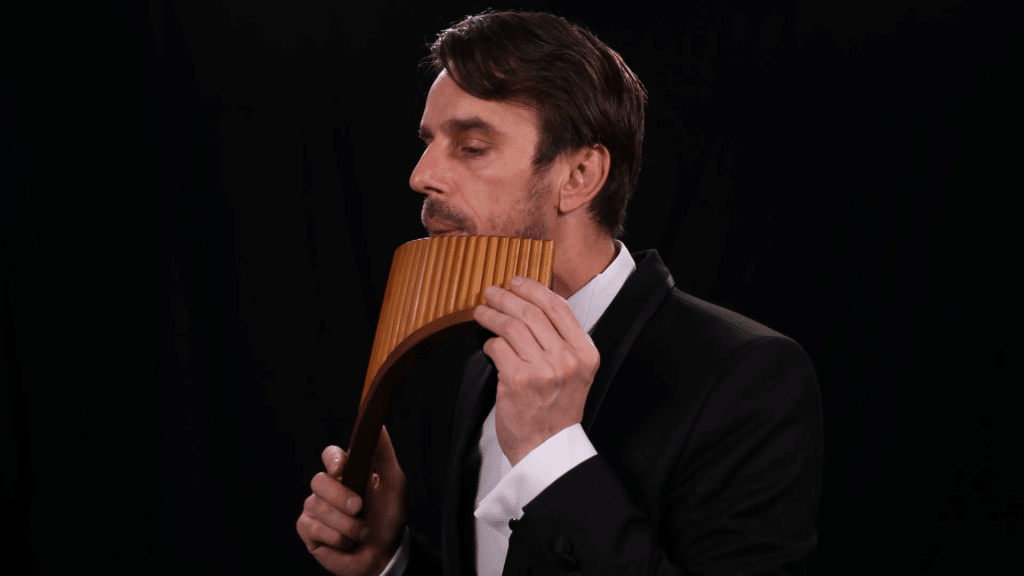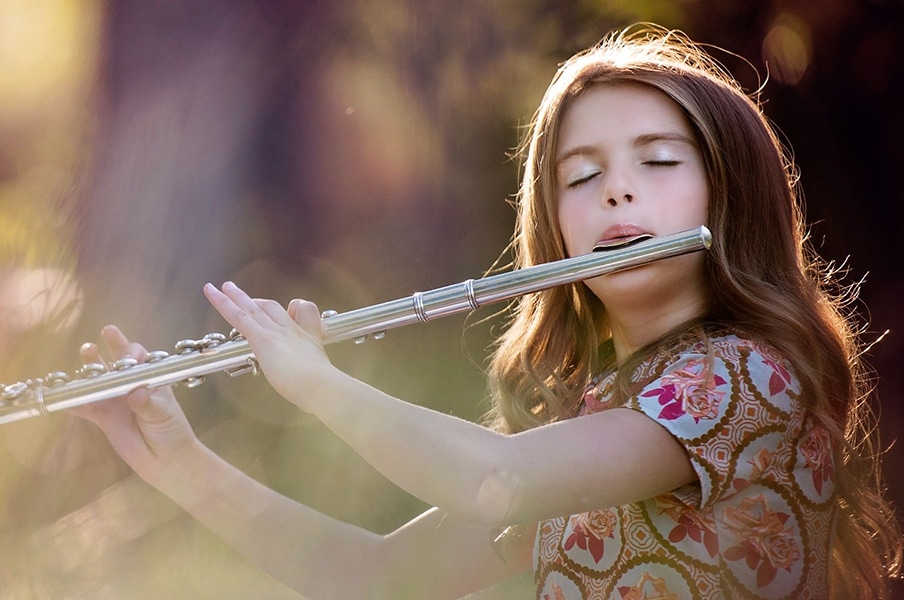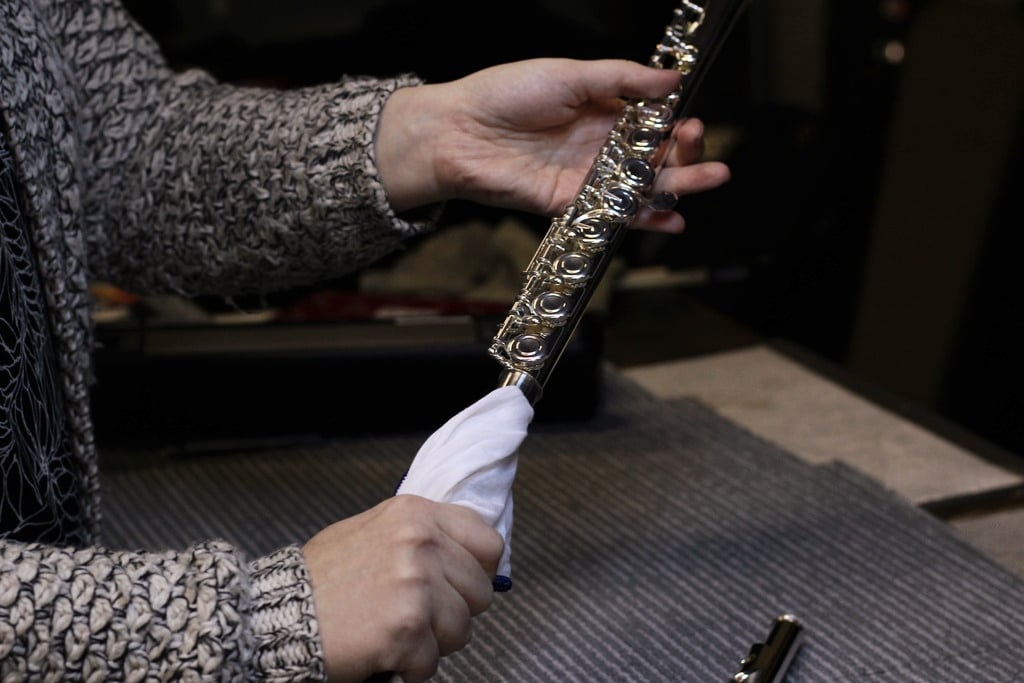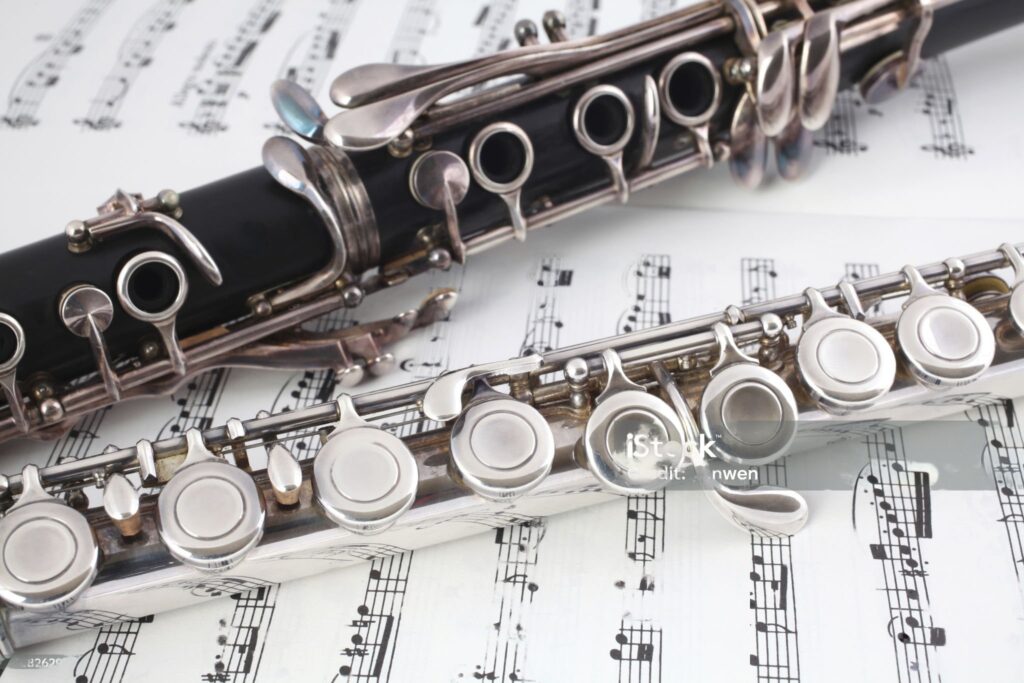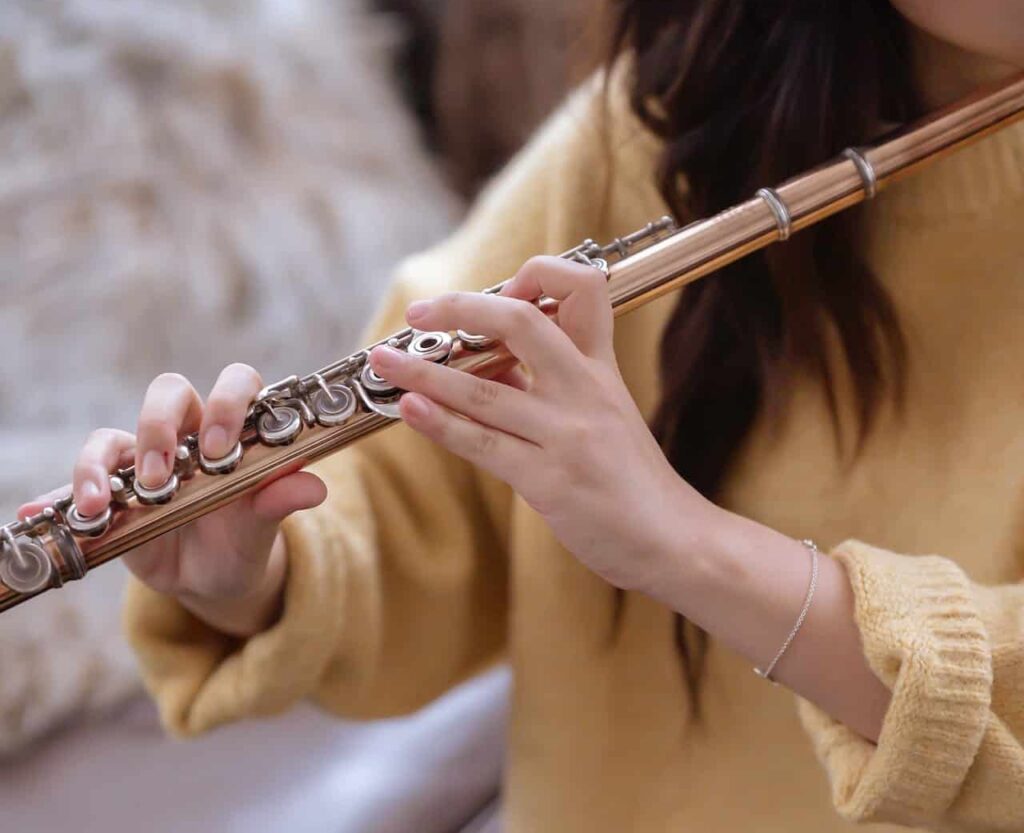Benefits of Yamaha flutes
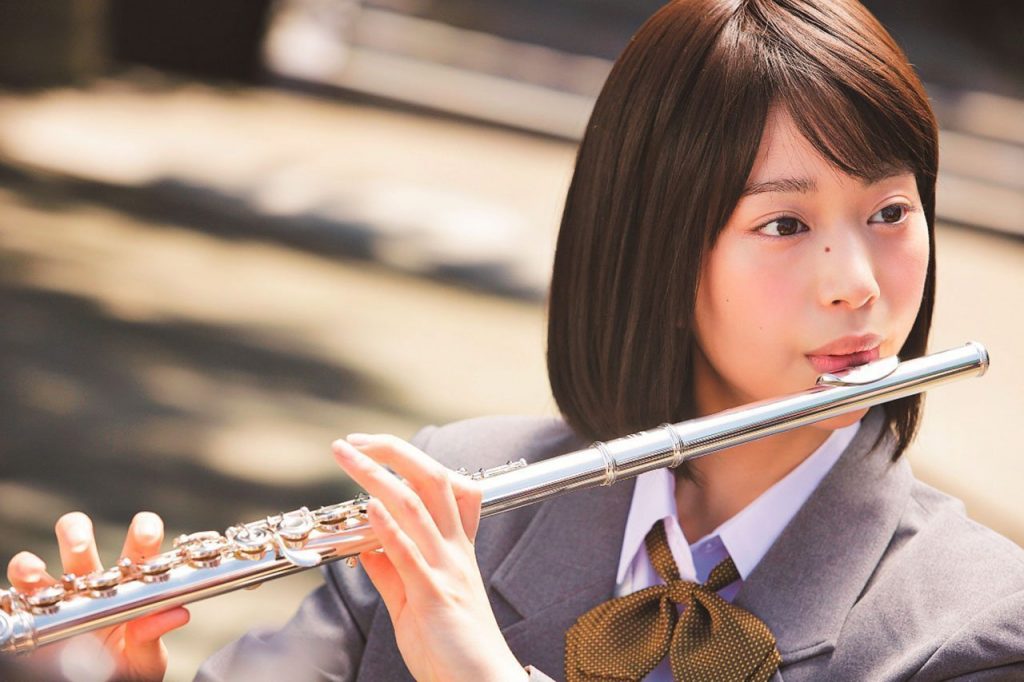 Yamaha flutes are constructed using quality materials for durability and good tonal quality. Material choices range from nickel-silver and sterling silver to gold for the high-end professional flutes.
Yamaha flutes are constructed using quality materials for durability and good tonal quality. Material choices range from nickel-silver and sterling silver to gold for the high-end professional flutes.
Another reason that makes Yamaha flutes attractive is the fact that they’re designed for use by flutists of all skill levels.
Consider your level
For a beginner, choose a student Yamaha flute. These are deliberately designed to be user-friendly for the inexperienced flutist, with the headjoint bent for easier reach and an offset G key for easy finger placement. Beginner flutes also feature plateau-style keys or closed holes, which make the flute easier to play for small and inexperienced fingers, and a C footjoint as the lowest note. These flutes are typically made from plastic or nickel and may or may not be silver-plated. Both materials are cheap and easy to maintain, which is what learner instruments need to be.
Once you’ve mastered the art of playing the flute, you’re ready to practice on an intermediate flute. A major step up from beginner flutes, intermediate flutes feature a silver headjoint which gives a rich tone, and open holes, which the player can now control with ease as they’ve learned how to manipulate the instrument. The keys are also inline, although this isn’t compulsory as more and more intermediate flutes have an offset G.
If your aim is to play at a professional level, you’ll need a professional flute. This is the most high-end category, with the flutes designed to give the richest of tones. As a standard, they feature open holes and are usually made from sterling silver. The most exclusive of these are constructed from gold or platinum, and as you can imagine, are quite expensive.
What about the money?
Good flutes come at a price. But how much can you expect to spend on average? For Yamaha student flutes, expect to spend several hundred dollars. Anything from $450-$1,000 is fair game. Intermediate Yamaha flutes will cost you upwards of $1,000, while professional Yamaha flutes can range from $3,000 plus if you get a good deal, to as high as $5,000 or more.
Features to consider while buying the best Yamaha flute
Below, we take a deeper look at the individual elements that matter when choosing a Yamaha flute.
Right size and weight
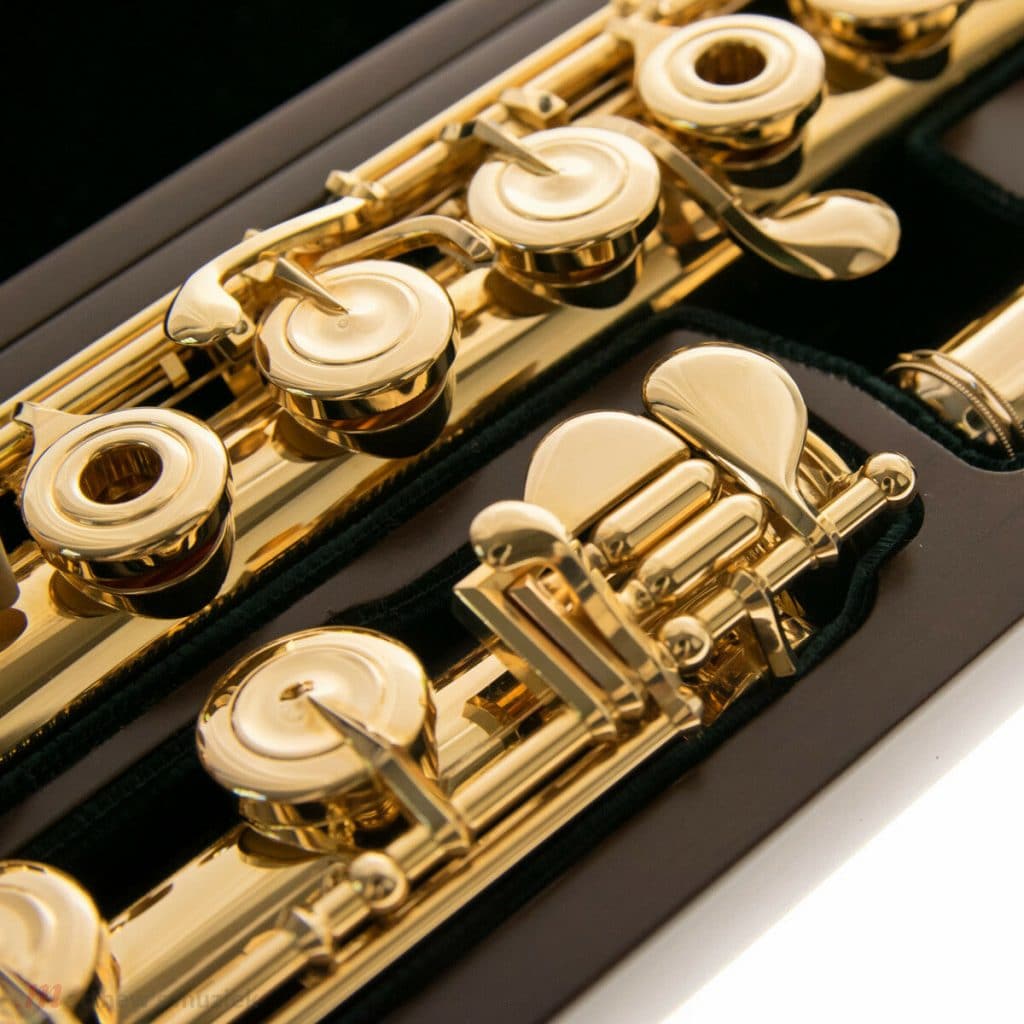 This applies mostly to beginner flutists who may be too small to handle the length and weight of a full-sized flute. The length of your arms determines how well you’re able to play the flute. To find out, place one end of a tape measure to your lips and check the position of your arm at the 16-inch mark. If your arm bends at a right angle, you’ll be able to play a full-size flute comfortably. If it doesn’t, a full-size pipe will be too big for you. Remember you’ll need to access all the holes with your fingers, and if the flute is too long, you won’t be able to reach the last set of holes. In this case, opt for a flute with a curved headjoint, which allows you to reach all the holes.
This applies mostly to beginner flutists who may be too small to handle the length and weight of a full-sized flute. The length of your arms determines how well you’re able to play the flute. To find out, place one end of a tape measure to your lips and check the position of your arm at the 16-inch mark. If your arm bends at a right angle, you’ll be able to play a full-size flute comfortably. If it doesn’t, a full-size pipe will be too big for you. Remember you’ll need to access all the holes with your fingers, and if the flute is too long, you won’t be able to reach the last set of holes. In this case, opt for a flute with a curved headjoint, which allows you to reach all the holes.
Also, for young players, flutes made from solid silver may be a tad too heavy to play for long stretches at a time. Opt for a lighter material like a nickel alloy (for Yamaha flutes, this almost exclusively means nickel-silver) which makes the instrument light enough to lift and play without straining. An excellent choice for beginner players is the YFL-222.
Open holes vs. closed ones
Open holes, also referred to as French-style holes, are almost exclusively used in intermediate and professional flutes. The player has to control the opening and closing of the holes using their fingers, and thus, control the tone of the flute. They must, therefore, be skilled and have the expertise to know how to do so and at what intervals.
Closed holes or plateau holes, also called German-style holes, are the preserve of beginner flutes. They allow the player to build on their technique and work on their embouchure skill without worrying about holes control, thus making the flute more natural to play. As they become more proficient, the flutist can then graduate to playing an open-holed flute.
Headjoint
The headjoint consists of the lip plate and riser and is where the flutist blows into to produce the flute sound. In intermediate and professional flutes, the headjoint is made from solid silver or granadilla wood, both of which give a rich, distinct tone. In beginner flutes, the headjoint is silver-plated, which makes it affordable for that skill level.
In most beginner flutes, the headjoint is also curved, which is recommended for a novice player. As your skill level improves, move to a flute with a straight headjoint, which will give you greater control over the sound quality.
Offset or inline G?
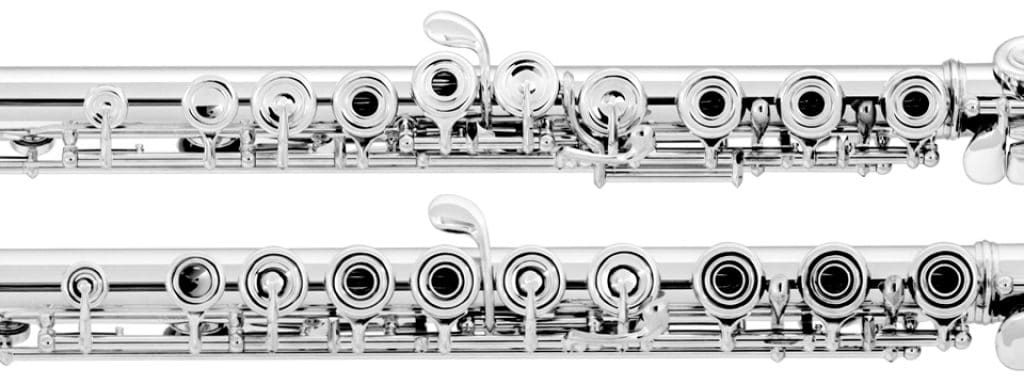 An offset G means that the G key is offset against the other keys, while an inline G means the G key is set in line with the rest. In the past, the offset G was found mainly in beginner flutes, with intermediate and professional pipes almost always making use of inline G keys.
An offset G means that the G key is offset against the other keys, while an inline G means the G key is set in line with the rest. In the past, the offset G was found mainly in beginner flutes, with intermediate and professional pipes almost always making use of inline G keys.
Because of its placement, the offset G key supports natural hand positioning while playing and is the more ergonomic option of the two. For this reason, manufacturers are opting to incorporate the offline G key in all flutes, including in intermediate and professional flutes like Yamaha YFL-677H and Yamaha YFL-322Y.
Material and plating
Overall, beginner flutes are made from affordable materials such as plastic and nickel alloys, the most common of which is nickel silver. To improve tone character, some parts of the flute are silver-plated, most notably the headjoint. Silver-plating also boosts the durability of the flute. Nickel flutes are light, durable, and easy to maintain, and have a lovely tone, qualities that make them ideal for the beginner.
Intermediate and professional flutes are made from more expensive materials, namely solid silver, gold, platinum, and wood. Of these, sterling silver is the most widely used, with the rest being rarer and quite expensive. While silver gives a rich, mellow tone, it also gets easily tarnished and needs careful handling. These materials are denser than nickel and hence notably heavier. Using them to make beginner flutes would pose a challenge to the younger players, as they would be too heavy for them.
Footjoint
Located at the furthest end of the flute, the footjoint comes in two types: B footjoint and C footjoint. The B footjoint consists of three keys and allows you to play a low B note, which is one key lower than you get in a C footjoint. This type is common in intermediate and professional flute. In a C footjoint, the lowest key is a low C, which is a key above a low B. You’ll find this mostly in beginner flutes. Even so, most melodies rarely call for you to hit a low B, and so you’ll hardly use it, even when playing at a professional level. This means the absence of a B footjoint shouldn’t be a dealbreaker when choosing a flute.
Warranty
The average Yamaha warranty for flutes covers a 5-year term. It entails repair or replacement of the flute if it malfunctions or becomes defective during the term of the warranty. To benefit from the warranty cover, you must have bought your flue from an authorized Yamaha dealer. Also, check whether the unit you want to buy is subject to a limitation of warranty and in what ways.






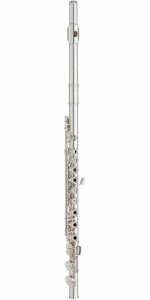
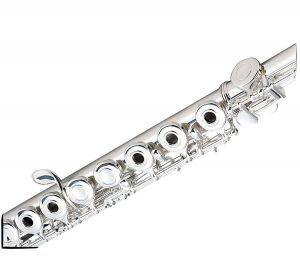

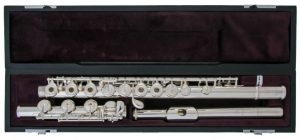

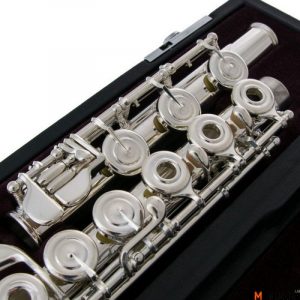
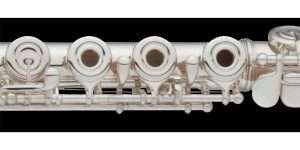
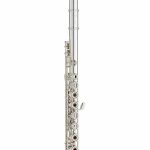
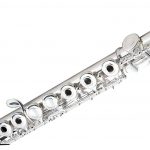
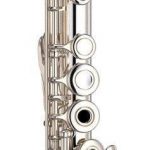


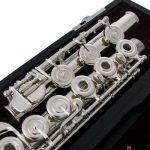
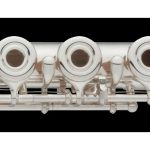
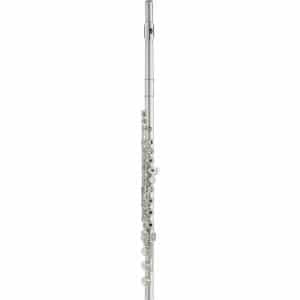
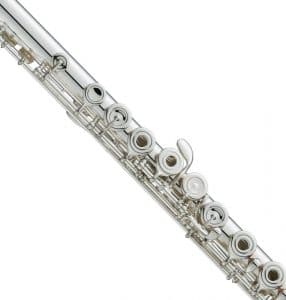
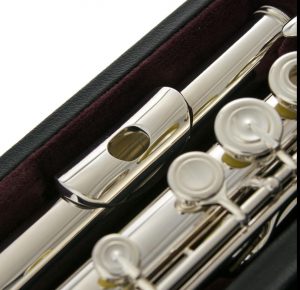
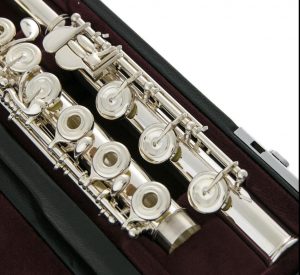
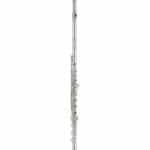
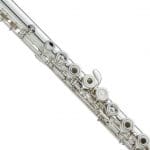

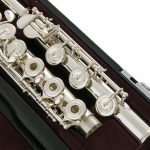
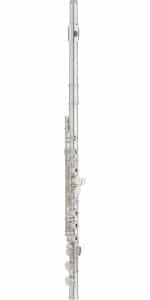
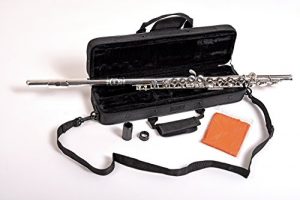
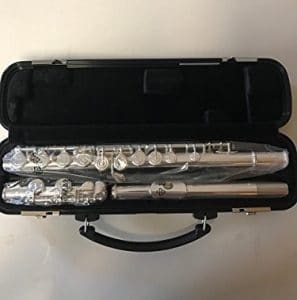
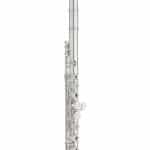
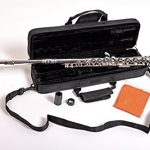

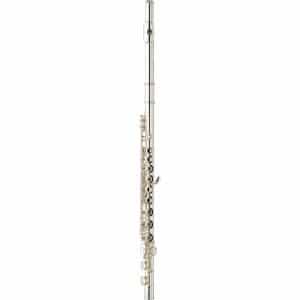



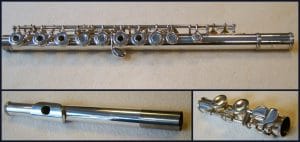
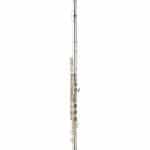




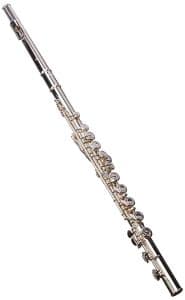
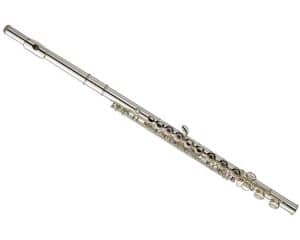


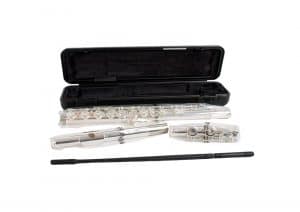



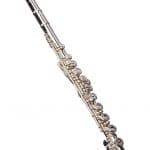







 Yamaha flutes are constructed using quality materials for durability and good tonal quality. Material choices range from nickel-silver and sterling silver to gold for the high-end professional flutes.
Yamaha flutes are constructed using quality materials for durability and good tonal quality. Material choices range from nickel-silver and sterling silver to gold for the high-end professional flutes. This applies mostly to beginner flutists who may be too small to handle the length and weight of a full-sized flute. The length of your arms determines how well you’re able to play the flute. To find out, place one end of a tape measure to your lips and check the position of your arm at the 16-inch mark. If your arm bends at a right angle, you’ll be able to play a full-size flute comfortably. If it doesn’t, a full-size pipe will be too big for you. Remember you’ll need to access all the holes with your fingers, and if the flute is too long, you won’t be able to reach the last set of holes. In this case, opt for a flute with a curved headjoint, which allows you to reach all the holes.
This applies mostly to beginner flutists who may be too small to handle the length and weight of a full-sized flute. The length of your arms determines how well you’re able to play the flute. To find out, place one end of a tape measure to your lips and check the position of your arm at the 16-inch mark. If your arm bends at a right angle, you’ll be able to play a full-size flute comfortably. If it doesn’t, a full-size pipe will be too big for you. Remember you’ll need to access all the holes with your fingers, and if the flute is too long, you won’t be able to reach the last set of holes. In this case, opt for a flute with a curved headjoint, which allows you to reach all the holes. An offset G means that the G key is offset against the other keys, while an inline G means the G key is set in line with the rest. In the past, the offset G was found mainly in beginner flutes, with intermediate and professional pipes almost always making use of inline G keys.
An offset G means that the G key is offset against the other keys, while an inline G means the G key is set in line with the rest. In the past, the offset G was found mainly in beginner flutes, with intermediate and professional pipes almost always making use of inline G keys.




